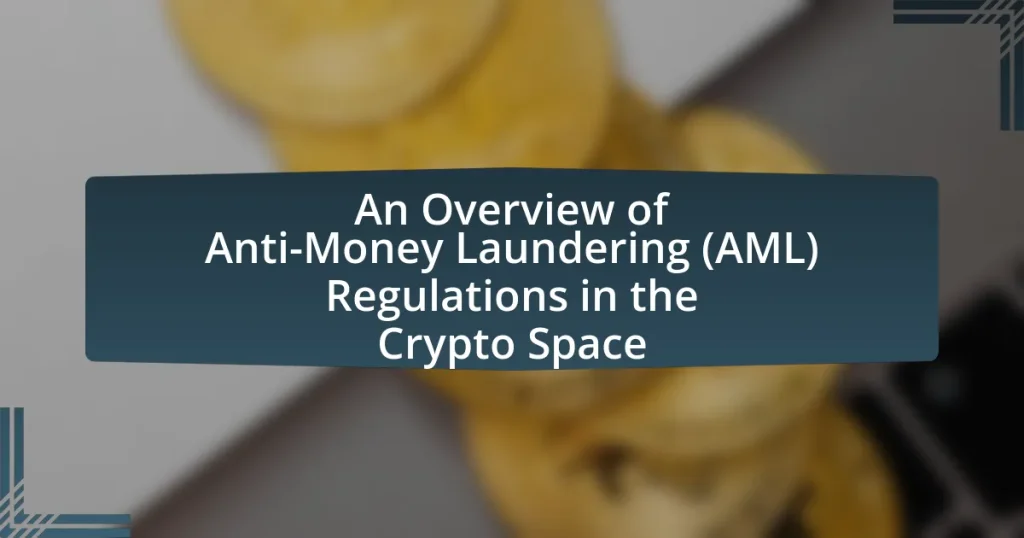Anti-Money Laundering (AML) regulations in the cryptocurrency space are essential legal frameworks aimed at preventing the use of digital currencies for illicit activities, including money laundering and terrorist financing. The article outlines how these regulations require cryptocurrency exchanges and service providers to implement measures such as customer identification, transaction monitoring, and reporting suspicious activities, aligning them with traditional financial institutions. Key components of AML regulations, including customer due diligence, risk assessment, and compliance challenges, are discussed, along with the importance of these regulations in fostering trust and transparency within the crypto industry. Additionally, the article highlights the role of international organizations like the Financial Action Task Force (FATF) in shaping AML standards and the consequences of non-compliance for crypto businesses.

What are Anti-Money Laundering (AML) Regulations in the Crypto Space?
Anti-Money Laundering (AML) Regulations in the crypto space are legal frameworks designed to prevent the use of cryptocurrencies for illicit activities such as money laundering and terrorist financing. These regulations require cryptocurrency exchanges and other financial institutions to implement measures like customer identification, transaction monitoring, and reporting suspicious activities to relevant authorities. For instance, the Financial Action Task Force (FATF) has established guidelines that recommend countries to enforce AML regulations on virtual asset service providers, ensuring compliance with international standards.
How do AML regulations apply to cryptocurrencies?
AML regulations apply to cryptocurrencies by requiring cryptocurrency exchanges and service providers to implement measures that prevent money laundering and terrorist financing. These regulations mandate customer identification processes, known as Know Your Customer (KYC), which involve verifying the identity of users before allowing transactions. For instance, the Financial Action Task Force (FATF) has issued guidelines stating that virtual asset service providers must adhere to the same AML obligations as traditional financial institutions. Compliance with these regulations is enforced through regular audits and reporting suspicious activities to relevant authorities, ensuring that cryptocurrencies are not used for illicit purposes.
What are the key components of AML regulations in the crypto sector?
The key components of AML regulations in the crypto sector include customer due diligence (CDD), transaction monitoring, reporting obligations, and risk assessment. Customer due diligence requires crypto businesses to verify the identity of their clients to prevent illicit activities. Transaction monitoring involves the ongoing scrutiny of transactions to identify suspicious patterns that may indicate money laundering. Reporting obligations mandate that businesses report certain transactions to relevant authorities, such as large or suspicious transactions. Risk assessment entails evaluating the potential risks associated with customers and transactions to implement appropriate controls. These components are essential for compliance with AML laws and help mitigate the risks of money laundering in the cryptocurrency ecosystem.
How do these components differ from traditional financial systems?
The components of anti-money laundering (AML) regulations in the crypto space differ from traditional financial systems primarily in their decentralized nature and the use of blockchain technology. Traditional financial systems rely on centralized institutions, such as banks, to monitor and report suspicious activities, whereas crypto AML regulations often depend on decentralized networks and automated protocols to track transactions. This shift allows for greater transparency and real-time monitoring of transactions, as blockchain records are immutable and publicly accessible. Additionally, the regulatory frameworks in the crypto space are still evolving, leading to varied compliance requirements across jurisdictions, unlike the more standardized regulations in traditional finance.
Why are AML regulations important for the crypto industry?
AML regulations are important for the crypto industry because they help prevent money laundering and terrorist financing activities. By implementing these regulations, cryptocurrency exchanges and businesses can enhance their transparency and accountability, which is crucial for gaining trust from users and regulators. For instance, the Financial Action Task Force (FATF) has established guidelines that require crypto platforms to conduct customer due diligence and report suspicious transactions, thereby aligning the crypto sector with traditional financial systems. This alignment not only mitigates risks associated with illicit activities but also fosters a safer environment for legitimate users, ultimately supporting the long-term growth and acceptance of cryptocurrencies in the global economy.
What risks does money laundering pose to the cryptocurrency market?
Money laundering poses significant risks to the cryptocurrency market by undermining its legitimacy and attracting regulatory scrutiny. The anonymity and decentralized nature of cryptocurrencies facilitate illicit activities, which can lead to increased fraud, market manipulation, and loss of investor confidence. For instance, a report by the Financial Action Task Force (FATF) indicated that approximately 2.1% of all cryptocurrency transactions in 2019 were linked to illicit activities, highlighting the scale of the issue. This environment can result in stricter regulations, potentially stifling innovation and limiting market growth.
How do AML regulations help in building trust among users?
AML regulations help in building trust among users by ensuring that financial transactions are monitored and that illicit activities are minimized. These regulations require businesses to implement strict customer verification processes, which enhances transparency and accountability. For instance, according to the Financial Action Task Force (FATF), compliance with AML standards reduces the risk of fraud and money laundering, thereby fostering a safer environment for users. This increased security leads to greater confidence in the integrity of the financial system, encouraging more users to engage in transactions.

What are the global standards for AML in the crypto space?
The global standards for Anti-Money Laundering (AML) in the crypto space are primarily defined by the Financial Action Task Force (FATF) recommendations. These standards require cryptocurrency exchanges and service providers to implement Know Your Customer (KYC) procedures, report suspicious transactions, and maintain records of transactions. The FATF’s 2019 guidance specifically emphasizes the need for virtual asset service providers (VASPs) to comply with the same AML obligations as traditional financial institutions, ensuring a risk-based approach to mitigate money laundering and terrorist financing risks.
How do international organizations influence AML regulations?
International organizations influence Anti-Money Laundering (AML) regulations by establishing global standards and frameworks that member countries are encouraged to adopt. For instance, the Financial Action Task Force (FATF) sets recommendations that guide nations in developing their AML policies, promoting consistency and effectiveness in combating money laundering and terrorist financing. The FATF’s 40 Recommendations serve as a benchmark, and countries that fail to comply may face economic sanctions or be placed on a blacklist, which underscores the importance of adherence to these guidelines. Additionally, organizations like the World Bank and the International Monetary Fund (IMF) provide technical assistance and funding to help countries implement robust AML frameworks, further reinforcing the influence of international bodies on national regulations.
What role does the Financial Action Task Force (FATF) play in AML compliance?
The Financial Action Task Force (FATF) establishes international standards and guidelines for Anti-Money Laundering (AML) compliance. FATF’s role includes assessing countries’ compliance with these standards, providing recommendations, and promoting effective implementation of AML measures globally. The organization conducts mutual evaluations to ensure that member countries adhere to its guidelines, which are crucial for combating money laundering and terrorist financing. As of 2021, FATF’s recommendations have been adopted by over 200 jurisdictions, emphasizing its significant influence in shaping AML policies worldwide.
How do different countries implement FATF recommendations?
Different countries implement FATF recommendations by integrating them into their national legal frameworks and regulatory practices. For instance, countries like the United States and the United Kingdom have established comprehensive AML laws that align with FATF guidelines, requiring financial institutions to conduct customer due diligence and report suspicious activities. In contrast, nations such as Japan have adopted specific regulations for cryptocurrency exchanges, mandating registration and compliance with FATF standards to mitigate risks associated with digital assets. This alignment with FATF recommendations is crucial for enhancing global cooperation in combating money laundering and terrorist financing, as evidenced by the FATF’s mutual evaluation reports that assess countries’ compliance and effectiveness in implementing these standards.
What are the challenges in enforcing AML regulations in the crypto space?
Enforcing AML regulations in the crypto space faces significant challenges due to the decentralized nature of cryptocurrencies, which complicates the identification of users and transactions. Traditional financial systems rely on centralized entities that can be monitored and regulated, whereas cryptocurrencies operate on a peer-to-peer basis, making it difficult for authorities to trace illicit activities. Additionally, the rapid evolution of technology and the emergence of new crypto assets outpace regulatory frameworks, leading to gaps in compliance. A report by the Financial Action Task Force (FATF) highlights that the anonymity provided by certain cryptocurrencies and mixing services further obscures transaction trails, hindering effective enforcement.
What technological barriers exist in monitoring cryptocurrency transactions?
Technological barriers in monitoring cryptocurrency transactions include the pseudonymous nature of transactions, the use of privacy coins, and the rapid evolution of blockchain technology. The pseudonymous characteristic allows users to transact without revealing their identities, complicating the tracking process. Privacy coins, such as Monero and Zcash, employ advanced cryptographic techniques to obscure transaction details, making it difficult for monitoring systems to analyze transaction flows. Additionally, the fast-paced development of blockchain technology often outstrips regulatory frameworks, leading to gaps in monitoring capabilities. These factors collectively hinder effective oversight and enforcement of anti-money laundering regulations in the cryptocurrency space.
How do decentralized platforms complicate AML efforts?
Decentralized platforms complicate Anti-Money Laundering (AML) efforts by obscuring transaction origins and user identities. These platforms operate without a central authority, making it challenging for regulators to enforce compliance and monitor suspicious activities. For instance, the use of pseudonymous wallets allows users to transact without revealing their identities, which hinders the ability to trace illicit funds. Additionally, the rapid growth and technological complexity of decentralized finance (DeFi) create gaps in regulatory oversight, as traditional AML frameworks are often ill-equipped to address the unique characteristics of these platforms.

What are the best practices for compliance with AML regulations in crypto?
The best practices for compliance with AML regulations in crypto include implementing robust customer due diligence (CDD) procedures, conducting regular transaction monitoring, and maintaining comprehensive records of transactions. CDD procedures help identify and verify the identity of customers, which is essential for preventing illicit activities. Regular transaction monitoring allows for the detection of suspicious activities, enabling timely reporting to authorities. Maintaining comprehensive records ensures that all necessary information is available for audits and investigations, which is crucial for regulatory compliance. These practices align with guidelines set forth by organizations such as the Financial Action Task Force (FATF), which emphasizes the importance of risk-based approaches in AML compliance.
How can cryptocurrency exchanges ensure compliance with AML regulations?
Cryptocurrency exchanges can ensure compliance with AML regulations by implementing robust Know Your Customer (KYC) procedures, conducting regular transaction monitoring, and maintaining comprehensive record-keeping practices. KYC procedures require exchanges to verify the identities of their users, which helps prevent illicit activities. Regular transaction monitoring allows exchanges to detect suspicious patterns and report them to relevant authorities, aligning with the Financial Action Task Force (FATF) guidelines. Additionally, maintaining detailed records of transactions and customer interactions supports transparency and accountability, which are essential for compliance. These measures collectively help mitigate the risks associated with money laundering in the cryptocurrency space.
What measures should exchanges implement for effective customer due diligence?
Exchanges should implement robust identity verification processes for effective customer due diligence. This includes collecting and verifying personal information such as name, address, date of birth, and government-issued identification. Additionally, exchanges should conduct ongoing monitoring of customer transactions to identify suspicious activities and ensure compliance with AML regulations. According to the Financial Action Task Force (FATF), effective customer due diligence is essential for preventing money laundering and terrorist financing, emphasizing the importance of these measures in the crypto space.
How can transaction monitoring systems enhance AML compliance?
Transaction monitoring systems enhance AML compliance by providing real-time analysis of transactions to identify suspicious activities. These systems utilize algorithms and machine learning to detect patterns indicative of money laundering, such as unusual transaction sizes or frequencies. According to a report by the Financial Action Task Force (FATF), effective transaction monitoring can significantly reduce the risk of financial institutions being exploited for illicit activities, thereby improving overall compliance with AML regulations.
What are the consequences of non-compliance with AML regulations?
Non-compliance with AML regulations can lead to severe financial penalties, legal repercussions, and reputational damage for organizations. Financial institutions may face fines that can reach millions of dollars, as evidenced by the $1.1 billion penalty imposed on Deutsche Bank in 2017 for inadequate AML controls. Additionally, non-compliance can result in criminal charges against individuals and organizations, leading to imprisonment or further legal actions. Reputational damage can also deter customers and investors, significantly impacting business operations and market position.
What penalties do crypto businesses face for failing to comply?
Crypto businesses face significant penalties for failing to comply with Anti-Money Laundering (AML) regulations, including hefty fines, legal sanctions, and potential criminal charges. For instance, the Financial Crimes Enforcement Network (FinCEN) can impose fines that reach millions of dollars, as seen in cases where companies failed to implement adequate AML measures. Additionally, non-compliance can lead to the revocation of licenses, restrictions on operations, and reputational damage, which can severely impact a business’s viability in the market.
How can non-compliance affect a company’s reputation and operations?
Non-compliance with regulations can severely damage a company’s reputation and disrupt its operations. When a company fails to adhere to anti-money laundering (AML) regulations, it risks facing legal penalties, which can include hefty fines and sanctions. For instance, in 2020, the FinCEN imposed a $60 million fine on a cryptocurrency exchange for failing to implement adequate AML measures, highlighting the financial repercussions of non-compliance.
Additionally, non-compliance can lead to loss of customer trust, as clients may perceive the company as untrustworthy or risky. A survey by PwC found that 78% of consumers would stop using a company that had been involved in a compliance scandal. This erosion of trust can result in decreased customer retention and a decline in new business opportunities.
Moreover, operationally, non-compliance can lead to increased scrutiny from regulators, resulting in more frequent audits and oversight, which can divert resources and focus away from core business activities. In summary, non-compliance negatively impacts a company’s reputation through legal penalties and loss of customer trust, while also disrupting operations due to increased regulatory scrutiny.
What practical steps can crypto businesses take to improve AML compliance?
Crypto businesses can improve AML compliance by implementing robust customer due diligence (CDD) procedures. These procedures should include verifying customer identities through reliable documentation, such as government-issued IDs, and conducting risk assessments to categorize customers based on their potential risk for money laundering activities.
Additionally, businesses should establish transaction monitoring systems that analyze customer transactions in real-time to detect suspicious activities. Regular training for employees on AML regulations and red flags associated with money laundering is also essential to ensure compliance.
Furthermore, maintaining comprehensive records of transactions and customer interactions is crucial for regulatory reporting and audits. Engaging with regulatory technology solutions can enhance compliance efforts by automating processes and ensuring adherence to evolving AML regulations.
These steps are supported by the Financial Action Task Force (FATF) guidelines, which emphasize the importance of risk-based approaches in AML compliance for financial institutions, including those in the crypto sector.










